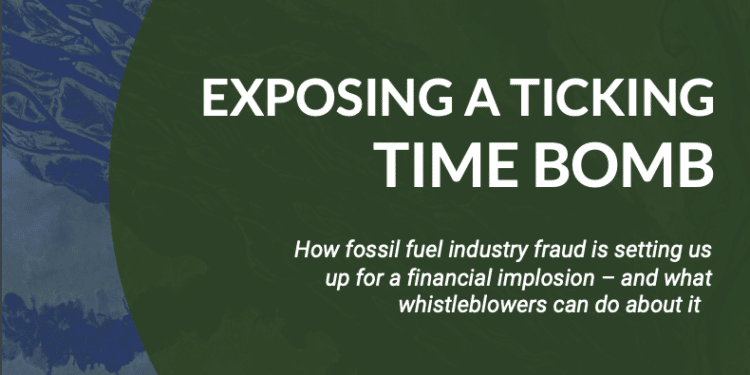The National Whistleblower Center (NWC) has released a report detailing how the fossil fuel industry has hidden systematic risk from their shareholders and how these deceptions could potentially devastate the global financial system. The report, titled Exposing a Ticking Time Bomb: How Fossil Fuel Industry Fraud is Setting Us Up for a Financial Implosion – and What Whistleblowers Can Do About It, claims that fossil fuel companies such as Exxonmobil have consistently concealed or downplayed “climate risks” to trick investors into continuing to believe in the long term stability of the industry. These fossil fuel companies are so tightly integrated into our financial system that their failure could cause a devastating chain reaction of crashes and failures for the global economy. The report predicts in a worst-case scenario that “the potential for rapid asset deflation at large fossil fuel companies is a ticking time bomb that, if not detected and addressed, could make the global financial system implode.”
Although fossil fuel companies have been denying evidence of climate change for decades, hiding information and downplaying risks to shareholders is a prosecutable SEC offense. These deceptions may also be prosecutable under the False Claims Act, and there are a number of lawsuits pending, most notably The Commonwealth of Massachusetts v. Exxon Mobil Corp. in which the state alleges that Exxon Mobil deceived investors.
The report revolves around examining higher levels of risk that has already been exposed, and predicting how much more risk there is left to be uncovered. The NWC used professional fraud investigators to examine the fuel companies with a three-pronged approach, looking at incentives, opportunities and rationalizations for fraud. They found that the companies were systematically deceiving their shareholders and the public in three general ways: by overstating the value of world fuel reserves, by understating environmental liabilities, or by understating physical risks to infrastructure. The report found that these three types of deception are rampant in the fossil fuel industry. John Kostyack, NWC Executive Director and lead author of the report said that “In light of the deceptions we found, the handful of pending fraud cases challenging climate risk disclosures by fossil fuel companies are probably just the tip of the iceberg.”
The report claims that whistleblowers are in a unique and essential position to uncover and prosecute this kind of fraud. The NWC hopes that by publishing this study, they can educate potential whistleblowers on their rights and encourage them to step forward and report fraud from inside these companies. The report also points out the key roles that whistleblowers have played in reforming the banking, tobacco and healthcare industries. The current U.S. domestic and foreign whistleblower laws have great potential for exposing the blatant securities fraud within the fossil fuel industry. The NWC will hold a panel of experts on this topic on July 30, recently recognized by the Senate as National Whistleblower Appreciation Day for the eighth year in a row.




